高中语法虚拟语气和it用法含习题
- 格式:doc
- 大小:108.50 KB
- 文档页数:14
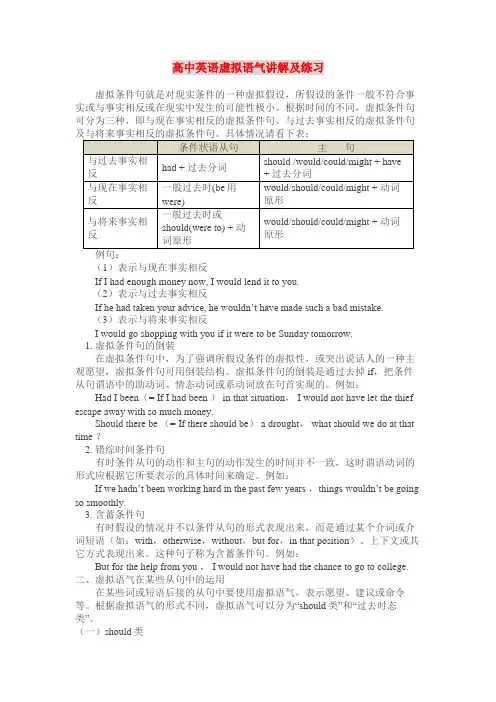
高中英语虚拟语气讲解及练习虚拟条件句就是对现实条件的一种虚拟假设,所假设的条件一般不符合事实或与事实相反或在现实中发生的可能性极小。
根据时间的不同,虚拟条件句可分为三种,即与现在事实相反的虚拟条件句、与过去事实相反的虚拟条件句(1)表示与现在事实相反If I had enough money now, I would lend it to you.(2)表示与过去事实相反If he had taken your advice, he wouldn’t have made such a bad mistake.(3)表示与将来事实相反I would go shopping with you if it were to be Sunday tomorrow.1. 虚拟条件句的倒装在虚拟条件句中,为了强调所假设条件的虚拟性,或突出说话人的一种主观愿望,虚拟条件句可用倒装结构。
虚拟条件句的倒装是通过去掉if,把条件从句谓语中的助动词、情态动词或系动词放在句首实现的。
例如:Had I been(= If I had been ) in that situation, I would not have let the thief escape away with so much money.Should there be (= If there should be) a drought, what should we do at that time ?2. 错综时间条件句有时条件从句的动作和主句的动作发生的时间并不一致,这时谓语动词的形式应根据它所要表示的具体时间来确定。
例如:If we hadn’t been working hard in the past few years ,thing s wouldn’t be going so smoothly.3. 含蓄条件句有时假设的情况并不以条件从句的形式表现出来,而是通过某个介词或介词短语(如:with,otherwise,without,but for,in that position)、上下文或其它方式表现出来。
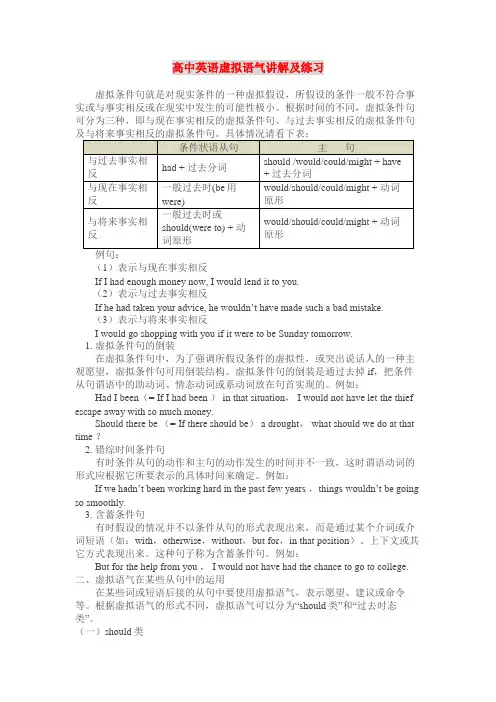
高中英语虚拟语气讲解及练习虚拟条件句就是对现实条件的一种虚拟假设,所假设的条件一般不符合事实或与事实相反或在现实中发生的可能性极小。
根据时间的不同,虚拟条件句可分为三种,即与现在事实相反的虚拟条件句、与过去事实相反的虚拟条件句(1)表示与现在事实相反If I had enough money now, I would lend it to you.(2)表示与过去事实相反If he had taken your advice, he wouldn’t have made such a bad mistake.(3)表示与将来事实相反I would go shopping with you if it were to be Sunday tomorrow.1. 虚拟条件句的倒装在虚拟条件句中,为了强调所假设条件的虚拟性,或突出说话人的一种主观愿望,虚拟条件句可用倒装结构。
虚拟条件句的倒装是通过去掉if,把条件从句谓语中的助动词、情态动词或系动词放在句首实现的。
例如:Had I been(= If I had been ) in that situation, I would not have let the thief escape away with so much money.Should there be (= If there should be) a drought, what should we do at that time ?2. 错综时间条件句有时条件从句的动作和主句的动作发生的时间并不一致,这时谓语动词的形式应根据它所要表示的具体时间来确定。
例如:If we hadn’t been working hard in the past few years ,thing s wouldn’t be going so smoothly.3. 含蓄条件句有时假设的情况并不以条件从句的形式表现出来,而是通过某个介词或介词短语(如:with,otherwise,without,but for,in that position)、上下文或其它方式表现出来。
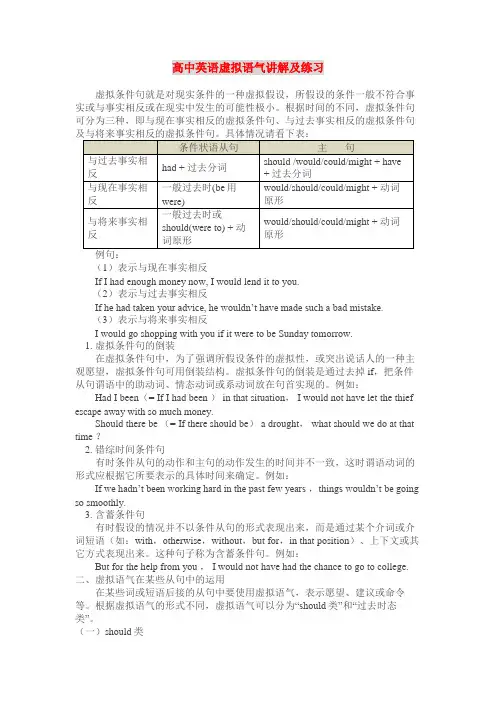
高中英语虚拟语气讲解及练习虚拟条件句就是对现实条件的一种虚拟假设,所假设的条件一般不符合事实或与事实相反或在现实中发生的可能性极小。
根据时间的不同,虚拟条件句可分为三种,即与现在事实相反的虚拟条件句、与过去事实相反的虚拟条件句(1)表示与现在事实相反If I had enough money now, I would lend it to you.(2)表示与过去事实相反If he had taken your advice, he wouldn’t have made such a bad mistake.(3)表示与将来事实相反I would go shopping with you if it were to be Sunday tomorrow.1. 虚拟条件句的倒装在虚拟条件句中,为了强调所假设条件的虚拟性,或突出说话人的一种主观愿望,虚拟条件句可用倒装结构。
虚拟条件句的倒装是通过去掉if,把条件从句谓语中的助动词、情态动词或系动词放在句首实现的。
例如:Had I been(= If I had been ) in that situation, I would not have let the thief escape away with so much money.Should there be (= If there should be) a drought, what should we do at that time ?2. 错综时间条件句有时条件从句的动作和主句的动作发生的时间并不一致,这时谓语动词的形式应根据它所要表示的具体时间来确定。
例如:If we hadn’t been working hard in the past few years ,thing s wouldn’t be going so smoothly.3. 含蓄条件句有时假设的情况并不以条件从句的形式表现出来,而是通过某个介词或介词短语(如:with,otherwise,without,but for,in that position)、上下文或其它方式表现出来。
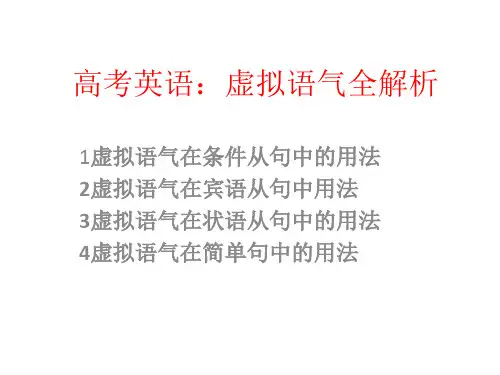
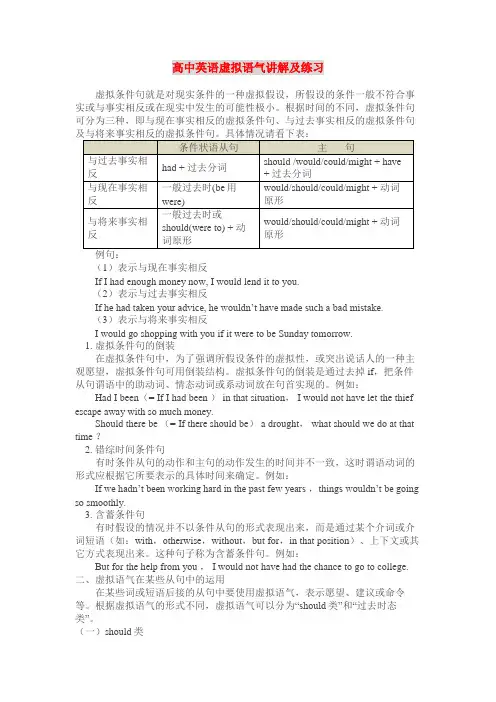
高中英语虚拟语气讲解及练习虚拟条件句就是对现实条件的一种虚拟假设,所假设的条件一般不符合事实或与事实相反或在现实中发生的可能性极小。
根据时间的不同,虚拟条件句可分为三种,即与现在事实相反的虚拟条件句、与过去事实相反的虚拟条件句(1)表示与现在事实相反If I had enough money now, I would lend it to you.(2)表示与过去事实相反If he had taken your advice, he wouldn’t have made such a bad mistake.(3)表示与将来事实相反I would go shopping with you if it were to be Sunday tomorrow.1. 虚拟条件句的倒装在虚拟条件句中,为了强调所假设条件的虚拟性,或突出说话人的一种主观愿望,虚拟条件句可用倒装结构。
虚拟条件句的倒装是通过去掉if,把条件从句谓语中的助动词、情态动词或系动词放在句首实现的。
例如:Had I been(= If I had been ) in that situation, I would not have let the thief escape away with so much money.Should there be (= If there should be) a drought, what should we do at that time ?2. 错综时间条件句有时条件从句的动作和主句的动作发生的时间并不一致,这时谓语动词的形式应根据它所要表示的具体时间来确定。
例如:If we hadn’t been working hard in the past few years ,thing s wouldn’t be going so smoothly.3. 含蓄条件句有时假设的情况并不以条件从句的形式表现出来,而是通过某个介词或介词短语(如:with,otherwise,without,but for,in that position)、上下文或其它方式表现出来。
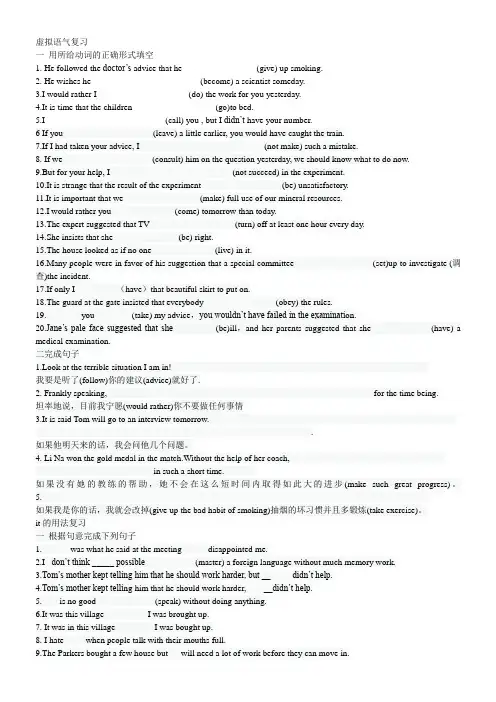
虚拟语气复习一用所给动词的正确形式填空1. He followed the doctor’s advice that he_________________(give) up smoking.2. He wishes he_________________________(become) a scientist someday.3.I would rather I_____________________(do) the work for you yesterday.4.It is time that the children___________________(go)to bed.5.I ___________________________(call) you , but I didn’t have your number.6 If you ____________________(leave) a little earlier, you would have caught the train.7.If I had taken your advice, I ____________________________(not make) such a mistake.8. If we ____________________(consult) him on the question yesterday, we should know what to do now.9.But for your help, I____________________________(not succeed) in the experiment.10.It is strange that the result of the experiment __________________(be) unsatisfactory.11.It is important that we _________________(make) full use of our mineral resources.12.I would rather you ______________(come) tomorrow than today.13.The expert suggested that TV ___________________(turn) off at least one hour every day.14.She insists that she_______________(be) right.15.The house looked as if no one ______________(live) in it.16.Many people were in favor of his suggestion that a special committee__________________(set)up to investigate (调查)the incident.17.If only I ________ (have)that beautiful skirt to put on.18.The guard at the gate insisted that everybody ________________(obey) the rules.19.________you ________(take) my advice,you wouldn’t have failed in the examinati on.20.Jane’s pale face suggested that she _________(be)ill,and her parents suggested that she _____________(have) a medical examination.二完成句子1.Look at the terrible situation I am in! __________________________________________________________我要是听了(follow)你的建议(advice)就好了.2. Frankly speaking, ____________________________________________________________ for the time being.坦率地说,目前我宁愿(would rather)你不要做任何事情3.It is said Tom will go to an interview tomorrow. ________________________________________________________ _______________________________________________________________.如果他明天来的话,我会问他几个问题。
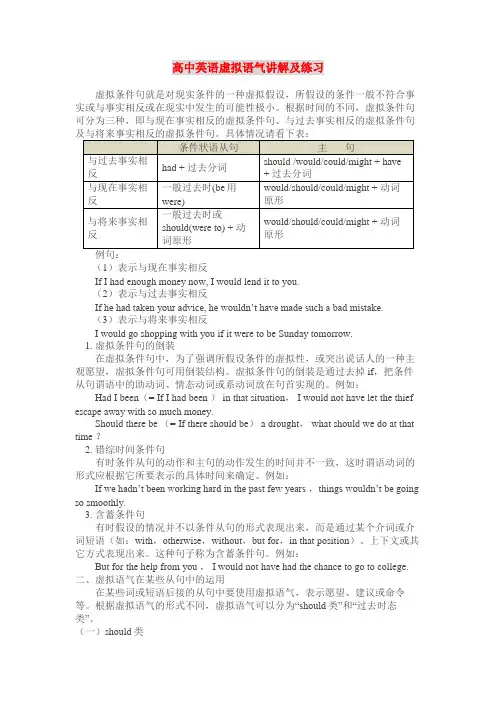
高中英语虚拟语气讲解及练习虚拟条件句就是对现实条件的一种虚拟假设,所假设的条件一般不符合事实或与事实相反或在现实中发生的可能性极小。
根据时间的不同,虚拟条件句可分为三种,即与现在事实相反的虚拟条件句、与过去事实相反的虚拟条件句(1)表示与现在事实相反If I had enough money now, I would lend it to you.(2)表示与过去事实相反If he had taken your advice, he wouldn’t have made such a bad mistake.(3)表示与将来事实相反I would go shopping with you if it were to be Sunday tomorrow.1. 虚拟条件句的倒装在虚拟条件句中,为了强调所假设条件的虚拟性,或突出说话人的一种主观愿望,虚拟条件句可用倒装结构。
虚拟条件句的倒装是通过去掉if,把条件从句谓语中的助动词、情态动词或系动词放在句首实现的。
例如:Had I been(= If I had been ) in that situation, I would not have let the thief escape away with so much money.Should there be (= If there should be) a drought, what should we do at that time ?2. 错综时间条件句有时条件从句的动作和主句的动作发生的时间并不一致,这时谓语动词的形式应根据它所要表示的具体时间来确定。
例如:If we hadn’t been working hard in the past few years ,thing s wouldn’t be going so smoothly.3. 含蓄条件句有时假设的情况并不以条件从句的形式表现出来,而是通过某个介词或介词短语(如:with,otherwise,without,but for,in that position)、上下文或其它方式表现出来。
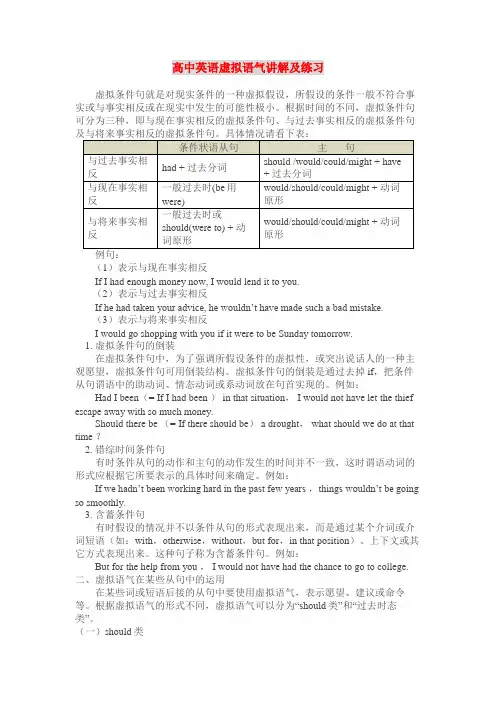
高中英语虚拟语气讲解及练习虚拟条件句就是对现实条件的一种虚拟假设,所假设的条件一般不符合事实或与事实相反或在现实中发生的可能性极小。
根据时间的不同,虚拟条件句可分为三种,即与现在事实相反的虚拟条件句、与过去事实相反的虚拟条件句(1)表示与现在事实相反If I had enough money now, I would lend it to you.(2)表示与过去事实相反If he had taken your advice, he wouldn’t have made such a bad mistake.(3)表示与将来事实相反I would go shopping with you if it were to be Sunday tomorrow.1. 虚拟条件句的倒装在虚拟条件句中,为了强调所假设条件的虚拟性,或突出说话人的一种主观愿望,虚拟条件句可用倒装结构。
虚拟条件句的倒装是通过去掉if,把条件从句谓语中的助动词、情态动词或系动词放在句首实现的。
例如:Had I been(= If I had been ) in that situation, I would not have let the thief escape away with so much money.Should there be (= If there should be) a drought, what should we do at that time ?2. 错综时间条件句有时条件从句的动作和主句的动作发生的时间并不一致,这时谓语动词的形式应根据它所要表示的具体时间来确定。
例如:If we hadn’t been working hard in the past few years ,thing s wouldn’t be going so smoothly.3. 含蓄条件句有时假设的情况并不以条件从句的形式表现出来,而是通过某个介词或介词短语(如:with,otherwise,without,but for,in that position)、上下文或其它方式表现出来。
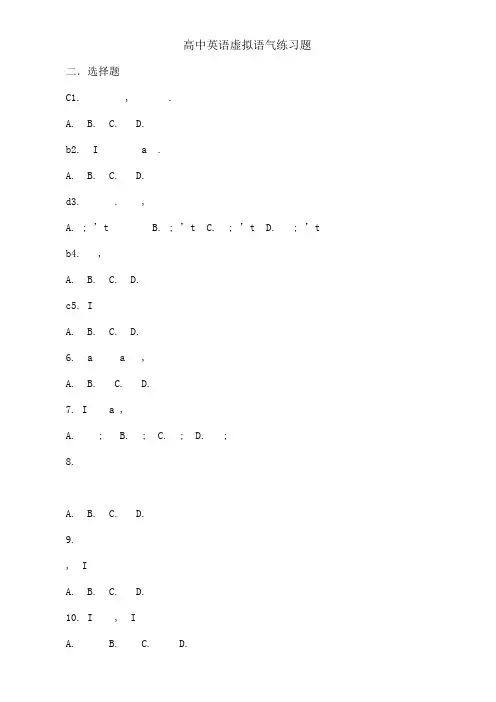
高中英语虚拟语气练习题二.选择题C1. , .A. B. C. D.b2. I a .A. B. C. D.d3. . ,A. ; ’tB. ; ’tC. ; ’tD. ; ’t b4. ,A. B. C. D.c5. IA. B. C. D.6. a a ,A. B. C. D.7. I a ,A. ;B. ;C. ;D. ;8.A. B. C. D.9., IA. B. C. D.10. I , IA. B. C. D.11. ,A. B. C. D.12. ,A. ,B. ,C. ,D. ,13. ,A. B. C. D.14. ,A. . C. D.15. ,A. B. C. D.16. I . ,A. B. C. D.17. , .A. ,B. ,C. ,D. ,18. ,A. ,B. ,C. ,D. ’t ,19. ,A. B. C. D.20.A. ’tB. ’tC. ’tD. ’t21. ’s , ,A. B. C. D.22.A. B. C. D.23. aA. B. C. D.24.,A. I’dB. I’dC. I ’ tD. I’d25. IA. ’tB. ’tC. ’tD. ’t26. ,A. B. C. D. ’t27. IA. B. ’t C. ’t D. ’t28.A. B. C. D.29.A. B. C. D.30. aA. B. C. D.31.A. ,B. ,C. ,D. ,32. I a IA. B. C. ’t D. ’t33.A. B. C. D.34.A. B. C. D.35.A. B. C. D.36. I IA. B. C. D.37.A. B. C. D.38. IA. B. C. D.39.A. B. C. D.40.A. B. C. D.41.A. B. C. D.42. , . I ……’t “”, I . , !A. B. ’t C. D. ’t43. I . . I IA. ,B. ,C. ,D. ,44. I I ! IA. B. ’t C. D. ’t45. I’t .A. B. C. D.46. ’sA. ,B. ,C. ,D. ,47. ,A. B. C. D.48. .A. ,B. ,C. ,D. ,49.A. B. C. D.50. a .A. B. C. D.51. ,A. B. C. D.52. aA. B. C. D.53. IA. B. C. D.54. , I a , I IA. B. C. D.55.A. B. C. D.56. I . ,A. B. C. D.57. ,A. B. C. D.58. ,A. ,B. ,C. ,D. ,答案C BD B C C C B A A D A B A C D B C D AD C C B A C B B A B D C C A B B D B A AC D C B C D D B C D B B A A A C D C虚拟语气在条件状语从句中的应用【经典例题】1. , .A. ;B. ;C. ;D. ;2. I , I .A. ’t B ’tC. ’tD. ’t3.— , .A. ;B. ;C. ;D. ;4. I ’t . , .A. B. C. D.【答案与解析】1.A.本题考查虚拟语气。
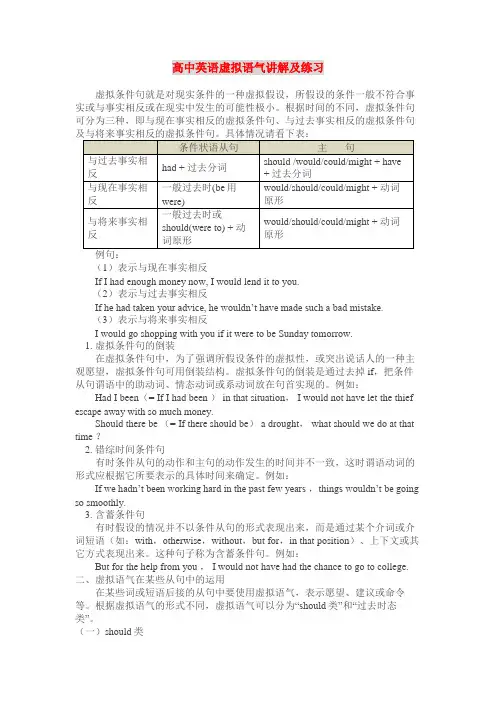
高中英语虚拟语气讲解及练习虚拟条件句就是对现实条件的一种虚拟假设,所假设的条件一般不符合事实或与事实相反或在现实中发生的可能性极小。
根据时间的不同,虚拟条件句可分为三种,即与现在事实相反的虚拟条件句、与过去事实相反的虚拟条件句(1)表示与现在事实相反If I had enough money now, I would lend it to you.(2)表示与过去事实相反If he had taken your advice, he wouldn’t have made such a bad mistake.(3)表示与将来事实相反I would go shopping with you if it were to be Sunday tomorrow.1. 虚拟条件句的倒装在虚拟条件句中,为了强调所假设条件的虚拟性,或突出说话人的一种主观愿望,虚拟条件句可用倒装结构。
虚拟条件句的倒装是通过去掉if,把条件从句谓语中的助动词、情态动词或系动词放在句首实现的。
例如:Had I been(= If I had been ) in that situation, I would not have let the thief escape away with so much money.Should there be (= If there should be) a drought, what should we do at that time ?2. 错综时间条件句有时条件从句的动作和主句的动作发生的时间并不一致,这时谓语动词的形式应根据它所要表示的具体时间来确定。
例如:If we hadn’t been working hard in the past few years ,thing s wouldn’t be going so smoothly.3. 含蓄条件句有时假设的情况并不以条件从句的形式表现出来,而是通过某个介词或介词短语(如:with,otherwise,without,but for,in that position)、上下文或其它方式表现出来。
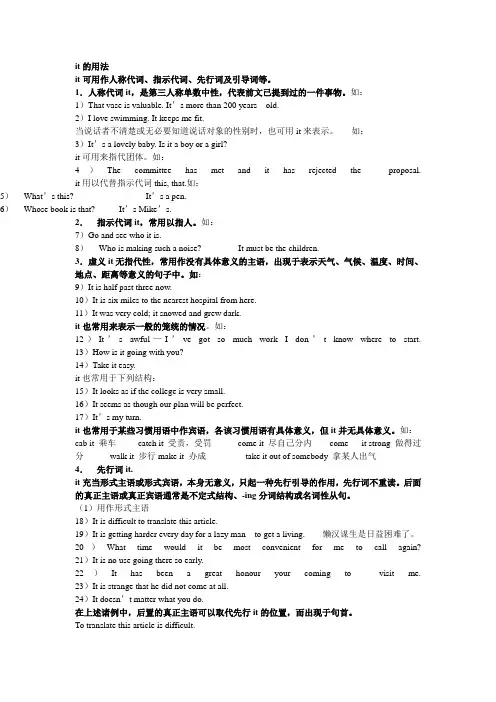
it的用法it可用作人称代词、指示代词、先行词及引导词等。
1.人称代词it,是第三人称单数中性,代表前文已提到过的一件事物。
如:1)That vase is valuable. It’s more than 200 years old.2)I love swimming. It keeps me fit.当说话者不清楚或无必要知道说话对象的性别时,也可用it来表示。
如:3)It’s a lovely baby. Is it a boy or a girl?it可用来指代团体。
如:4)The committee has met and it has rejected the proposal. it用以代替指示代词this, that.如:5)--- What’s this? --- It’s a pen.6)--- Whose book is that? --- It’s Mike’s.2.指示代词it,常用以指人。
如:7)Go and see who it is.8)--- Who is making such a noise? --- It must be the children.3.虚义it无指代性,常用作没有具体意义的主语,出现于表示天气、气候、温度、时间、地点、距离等意义的句子中。
如:9)It is half past three now.10)It is six miles to the nearest hospital from here.11)It was very cold; it snowed and grew dark.it也常用来表示一般的笼统的情况。
如:12)It’s awful—I’ve got so much work I don’t know where to start. 13)How is it going with you?14)Take it easy.it也常用于下列结构:15)It looks as if the college is very small.16)It seems as though our plan will be perfect.17)It’s my turn.it也常用于某些习惯用语中作宾语,各该习惯用语有具体意义,但it并无具体意义。
高中英语虚拟语气讲解及练习虚拟条件句就是对现实条件的一种虚拟假设,所假设的条件一般不符合事实或与事实相反或在现实中发生的可能性极小。
根据时间的不同,虚拟条件句可分为三种,即与现在事实相反的虚拟条件句、与过去事实相反的虚拟条件句(1)表示与现在事实相反If I had enough money now, I would lend it to you.(2)表示与过去事实相反If he had taken your advice, he wouldn’t have made such a bad mistake.(3)表示与将来事实相反I would go shopping with you if it were to be Sunday tomorrow.1. 虚拟条件句的倒装在虚拟条件句中,为了强调所假设条件的虚拟性,或突出说话人的一种主观愿望,虚拟条件句可用倒装结构。
虚拟条件句的倒装是通过去掉if,把条件从句谓语中的助动词、情态动词或系动词放在句首实现的。
例如:Had I been(= If I had been ) in that situation, I would not have let the thief escape away with so much money.Should there be (= If there should be) a drought, what should we do at that time ?2. 错综时间条件句有时条件从句的动作和主句的动作发生的时间并不一致,这时谓语动词的形式应根据它所要表示的具体时间来确定。
例如:If we hadn’t been working hard in the past few years ,thing s wouldn’t be going so smoothly.3. 含蓄条件句有时假设的情况并不以条件从句的形式表现出来,而是通过某个介词或介词短语(如:with,otherwise,without,but for,in that position)、上下文或其它方式表现出来。
高中英语虚拟语气讲解及练习虚拟条件句就是对现实条件的一种虚拟假设,所假设的条件一般不符合事实或与事实相反或在现实中发生的可能性极小。
根据时间的不同,虚拟条件句可分为三种,即与现在事实相反的虚拟条件句、与过去事实相反的虚拟条件句(1)表示与现在事实相反If I had enough money now, I would lend it to you.(2)表示与过去事实相反If he had taken your advice, he wouldn’t have made such a bad mistake.(3)表示与将来事实相反I would go shopping with you if it were to be Sunday tomorrow.1. 虚拟条件句的倒装在虚拟条件句中,为了强调所假设条件的虚拟性,或突出说话人的一种主观愿望,虚拟条件句可用倒装结构。
虚拟条件句的倒装是通过去掉if,把条件从句谓语中的助动词、情态动词或系动词放在句首实现的。
例如:Had I been(= If I had been ) in that situation, I would not have let the thief escape away with so much money.Should there be (= If there should be) a drought, what should we do at that time ?2. 错综时间条件句有时条件从句的动作和主句的动作发生的时间并不一致,这时谓语动词的形式应根据它所要表示的具体时间来确定。
例如:If we hadn’t been working hard in the past few years ,thing s wouldn’t be going so smoothly.3. 含蓄条件句有时假设的情况并不以条件从句的形式表现出来,而是通过某个介词或介词短语(如:with,otherwise,without,but for,in that position)、上下文或其它方式表现出来。
高中英语虚拟语气讲解及练习虚拟条件句就是对现实条件的一种虚拟假设,所假设的条件一般不符合事实或与事实相反或在现实中发生的可能性极小。
根据时间的不同,虚拟条件句可分为三种,即与现在事实相反的虚拟条件句、与过去事实相反的虚拟条件句(1)表示与现在事实相反If I had enough money now, I would lend it to you.(2)表示与过去事实相反If he had taken your advice, he wouldn’t have made such a bad mistake.(3)表示与将来事实相反I would go shopping with you if it were to be Sunday tomorrow.1. 虚拟条件句的倒装在虚拟条件句中,为了强调所假设条件的虚拟性,或突出说话人的一种主观愿望,虚拟条件句可用倒装结构。
虚拟条件句的倒装是通过去掉if,把条件从句谓语中的助动词、情态动词或系动词放在句首实现的。
例如:Had I been(= If I had been ) in that situation, I would not have let the thief escape away with so much money.Should there be (= If there should be) a drought, what should we do at that time ?2. 错综时间条件句有时条件从句的动作和主句的动作发生的时间并不一致,这时谓语动词的形式应根据它所要表示的具体时间来确定。
例如:If we hadn’t been working hard in the past few years ,thing s wouldn’t be going so smoothly.3. 含蓄条件句有时假设的情况并不以条件从句的形式表现出来,而是通过某个介词或介词短语(如:with,otherwise,without,but for,in that position)、上下文或其它方式表现出来。
高中英语虚拟语气讲解及练习虚拟条件句就是对现实条件的一种虚拟假设,所假设的条件一般不符合事实或与事实相反或在现实中发生的可能性极小。
根据时间的不同,虚拟条件句可分为三种,即与现在事实相反的虚拟条件句、与过去事实相反的虚拟条件句(1)表示与现在事实相反If I had enough money now, I would lend it to you.(2)表示与过去事实相反If he had taken your advice, he wouldn’t have made such a bad mistake.(3)表示与将来事实相反I would go shopping with you if it were to be Sunday tomorrow.1. 虚拟条件句的倒装在虚拟条件句中,为了强调所假设条件的虚拟性,或突出说话人的一种主观愿望,虚拟条件句可用倒装结构。
虚拟条件句的倒装是通过去掉if,把条件从句谓语中的助动词、情态动词或系动词放在句首实现的。
例如:Had I been(= If I had been ) in that situation, I would not have let the thief escape away with so much money.Should there be (= If there should be) a drought, what should we do at that time ?2. 错综时间条件句有时条件从句的动作和主句的动作发生的时间并不一致,这时谓语动词的形式应根据它所要表示的具体时间来确定。
例如:If we hadn’t been working hard in the past few years ,thing s wouldn’t be going so smoothly.3. 含蓄条件句有时假设的情况并不以条件从句的形式表现出来,而是通过某个介词或介词短语(如:with,otherwise,without,but for,in that position)、上下文或其它方式表现出来。
高中英语虚拟语气讲解及练习虚拟条件句就是对现实条件的一种虚拟假设,所假设的条件一般不符合事实或与事实相反或在现实中发生的可能性极小。
根据时间的不同,虚拟条件句可分为三种,即与现在事实相反的虚拟条件句、与过去事实相反的虚拟条件句(1)表示与现在事实相反If I had enough money now, I would lend it to you.(2)表示与过去事实相反If he had taken your advice, he wouldn’t have made such a bad mistake.(3)表示与将来事实相反I would go shopping with you if it were to be Sunday tomorrow.1. 虚拟条件句的倒装在虚拟条件句中,为了强调所假设条件的虚拟性,或突出说话人的一种主观愿望,虚拟条件句可用倒装结构。
虚拟条件句的倒装是通过去掉if,把条件从句谓语中的助动词、情态动词或系动词放在句首实现的。
例如:Had I been(= If I had been ) in that situation, I would not have let the thief escape away with so much money.Should there be (= If there should be) a drought, what should we do at that time ?2. 错综时间条件句有时条件从句的动作和主句的动作发生的时间并不一致,这时谓语动词的形式应根据它所要表示的具体时间来确定。
例如:If we hadn’t been working hard in the past few years ,thing s wouldn’t be going so smoothly.3. 含蓄条件句有时假设的情况并不以条件从句的形式表现出来,而是通过某个介词或介词短语(如:with,otherwise,without,but for,in that position)、上下文或其它方式表现出来。
(完整版)虚拟语气讲解及练习题(含答案和解释)虚拟语气讲解与练习黄志刚2013.10.一. 简介虚拟语气用来表示说话人的主观愿望或假想,而不表示客观存在的事实,所说的是一个条件,不一定是事实,或与事实相反。
虚拟语气通过谓语动词的特殊形式来表示。
英语中的语气分为陈述语气、祈使语气、虚拟语气在什么情况下用虚拟语气? 在表示虚假的、与事实相反的或难以实现的情况时用虚拟语气,表示主观愿望或表示某种强烈情感时,也用虚拟语气。
即当一个人说话时欲强调其所说的话是基于自己的主观想法,而不是根据客观实际,就用虚拟语气。
二. 虚拟语气在非真实条件状语从句中的用法1、真实条件状语从句与非真实条件状语从句真:eg . If he doesn’t hurry up, he will miss the bus. 如果他不快点,他将错过巴士。
( 真实条件状语)(不是虚拟语气)If he is free, he will ask me to tell stories. 如果他是空闲的,他会要求我讲故事。
(真实条件状语)(不是虚拟语气)非真:eg. If I were you, I would go at once.如果我是你,我马上就会去。
(非真实条件状语从句)If there were no air, people would die. 如果没有空气,人就会死亡。
(非真实条件状语从句)2、用法及动词形式1、表示与现在事实相反的情况,例1.If I were you, I would take an umbrella.如果我是你,我会带把伞。
(事实:我不可能是你) 2.If I knew his telephone number, I would tell you. 如果我知道他的电话号码,我就会告诉你。
(事实:不知道) 3.If there were no air orwater, there would be no living things on the earth. 如果没有水和空气,地球上就不会有生物。
虚拟语气讲义I、虚拟语气在条件句中的应用(1)与现在事实相反I would certainly go if I had the time. (The fact is that I have no time.)If he were here, everything would be all right. (He is not here in fact.) (2)与过去事实相反If I had left a little earlier, I would have caught the train.I would have made a bad mistake if I hadn‟t taken your advice.(3)与将来事实相反If I were to do it, I would do it in a different way. (I will not do it.We wouldn‟t lose courage even if we should fail again.3.特殊结构的虚拟条件句(1)If it were not for…If it had not been for…but for…相当于without例如:If it were not for your help, I could never go to college.But for the captain, the ship would have sunk with all the passengers on board.If it had not been for the PLA men, his hometown might have been destroyed by the big flood.(2)假设的情况通过上下文表示出来I was ill that day. Otherwise I would have taken part in the procession.I would have called on you during my stay in Hongkong, but I didn‟t know your address.You were not on the plane, or you would have been killed.Without electricity, there would be no modern industry.(3)如果条件句中有动词were, had, 或should,可省略if, 把这些动词放在主语前面Had they time, they would certainly come and help us. (= If they had time, they ….)Should I be free tomorrow, I would come to attend your meeting. (= If I should be free, I ….)Were I in your position, I wouldn‟t let him go there.(4)错综条件句、混合条件句在有些虚拟条件句中,虚拟的主句动作与从句动作并不在同一时间发生,这种从句与主句动作发生时间不一致的虚拟条件句称为错综时间条件句或叫混合条件句。
这时从句与主句按各自发生的时间构成相应的虚拟式。
If you had followed my advice, you would not be in such trouble now.If he had told me his telephone number yesterday, I would be able to ring him up now.II、虚拟语气在宾语从句中的应用在表示建议、要求、命令等动词的宾语从句中,从句中常用(should) do 形式。
(suggest, require, demand, order, command, request, ask, insist…)例如:I require that he come by ten.The doctor suggested that his uncle not go on that trip to London.The headmaster asked / demanded that all the students attend the meeting. The officer ordered that the soldiers should start out at once.(1)在这些动词构成的主语从句中也用虚拟语气It is suggested that we (should) get everything ready by tonight.It was ordered that no language should be taught in that school except German.(2)在It is necessary / important / strange / a pity…that 从句中也用虚拟语气It is necessary that he (should) be sent there at once.It is strange that she should have failed to see her own shortcomings. (3)由这些动词转化来的名词后的同位语从句或表语从句中也用虚拟语气。
My suggestion is that we (should) send a few comrades to help the other groups.What do you think of the suggestion that we (should) put on a play at the English evening?注1:suggest当“暗示、说明”时,不用虚拟语气。
如:The expression on his face suggested that he was happy.注2:insist表示“强调说”时不用虚拟语气。
如:She insisted that she was right when she insisted that the patient should be sent to hospital immediately.III. 虚拟语气在某些单词和短语中的应用(1)It’s (high) time that…①did(were) ②should doIt‟s time you went t o bed. You look so tired.It‟s high time that you thought of your future.(2)as if / though ①did(were)现在②had done过去They talked (are talking) as if they had been friends for years.It seems as if / though it were spring already.(3)wish ①did(were)现在②had done过去③would/could/might/should do将来I wish I helped you every day.I wish I would / could help you tomorrow.I wish I had helped you yesterday.(4)would rather ①had done过去②did(were)现在,将来I would rather you came next weekend.I‟d rather you hadn‟t d one that.(5)if only ①had done过去②did(were)现在,将来If only I were younger! If only I had listened to your advice at that time!虚拟语气练习1. If only he ____quietly as the doctor instructed, he would not suffer so much now.A. liesB. layC. had lainD. should lie2. How I wish every family ____a large house with a beautiful garden.A. hasB. hadC. will haveD. had had3. You did not let me drive. If we ____in turn, you ____ so tired.A. drove; didn‟t getB. drove; wou ldn‟t getC. were driving; wouldn‟t getD. had driven; wouldn‟t have got4. _____it rain tomorrow, we would have to put off the visit to the Yangpu Bridge.A. WereB. ShouldC. WouldD. Will5. ---I‟ll tell Mary about her new job tomor row.---You _____ her last week.A. ought to tellB. would have toldC. must tellD.should have told6. When a pencil is partly in a glass of water, it looks as if it____.A. breaksB. has brokenC. were brokenD. had been broken7. I insisted _____to see a doctor, but he insisted nothing ___ wrong with him.A. on him to go; should beB. he went; beC. he go; wasD. he should go; is8. It is hard for me to imagine what I would be doing today if I _____ in love at the age ofseven, with the Melinda Cox library in my hometown.A. wouldn‟t have fallenB. had not fallenC. should fallD. were to fall9. I arrived late; I _____ the road to be so icy.A. wouldn‟t expectB. haven‟t expectedC. hadn‟t expectedD. wasn‟t e xpecting10. I was ill that day, otherwise I ____ the sports meet.A. would have taken part inB. took part inC. had taken part inD. would take part in11. ___the clouds, you would find the airplane in the sky easily.A. Had it not been forB. If it were notC. If it had not been forD. Were it not for12. If my lawyer ____here last Sunday, he ____ me from going.A. had been, would have preventedB. had been, would preventC. were, preventD. were, would have prevented13. ____hard, he would have passed the exam.A. If he were to workB. Had he workedC. Should he workD. Were he to work14. ____today, he would get there by Friday.A. Were he to leaveB. If he had leftC. Did he to leaveD. Had he left15. Had you listened to the doctor, you ____all right now.A. areB. wereC. would beD. would have been16. I did not see your sister at the meeting. If she ____, she would havemet my brother.A. has comeB. did comeC. comeD. had come17. He ____busy yesterday, or he ___you with your experiment.A. was, had helpedB. was, would have helpedC. had been, would have helpedD. were, would have helped18. If it ____for the snow, we____ the mountain yesterday.A. were not, could have climbB. were not, could climbC. had not been, could have climbedD. hadn‟t been, could climb19. Without electricity, human life ____quite difficult today.A. isB. will beC. would have beenD. would be20. If there were no subjunctive mood, English _____ much easier.A. will beB. would have beenC. could have beenD. would be21. Mike‟s father, as well as his mother, insi sted he ____home.A. stayedB. could stayC. has stayedD. stay22. It was requested that the play ____again.A. should put onB. would put onC. be put onD. put on23. She insisted that a doctor _____ immediately.A. had sent forB. sendC. be sent forD. was sent24. ---Did you scold him for his carelessness.----Yes, but ____itA. I‟d rather not doB. I‟d rather not have doneC. I should‟ t doD. I‟d better not do25. If only I ___my car.A. hadn‟t lostB. w ouldn‟t loseC. didn‟t loseD. haven‟t lost26. But for water, it ____impossible to live in the earth.A. isB. would beC. wereD. wouldn‟t be27. If I _____ plan to do anything I want to, I‟d like to go to Tibet andtravel through as much of it as possible.A. wouldB. couldC. had toD. ought to28. The kind-hearted couple treat the orphan very well as though he ____ their own son.A. isB. wereC. had beenD. should be29. ---Don‟t you think it necessary that he _____ to Miami but to New York?---I agree, but the problem is _____ he has refused to.A. will not be sent; thatB. not be sent; thatC. should not be sent; whatD. should not sent; what30. It is high time that we ____ a meeting to discuss this problem.A. holdB. heldC. have heldD. had held31. The thief closed his eyes ____ he ____dying.A. even if , wasB. though, would beC. even, had beenD. as if, were32. I wish that you ____ such a bad headache because I am sure that youwould have enjoyed the concert.A. had notB. did not have hadC. hadn‟t hadD.hadn‟t ha ve33. The chairman insisted that we ____the question again.A. will discussB. to discussC. should discussD. will be discussed34. He requested that the students ____them get in crops.A. helpB. to helpC. helpedD. helping35. The guard at the gate insisted that everybody _____the rules.A. obeysB. obeyC. will obeyD. would obey36. I wish I ____here then.A. wasB. had beenC. wereD. would be37. It is strange that he ____back so early.A. cameB. will comeC. had comeD. shouldhave come38. Mother suggested that I ___my homework first before watching TV.A. didB. doC. shall doD. have done39. My suggestion is that the meeting ____off till nest Sunday.A. be putB. putC. should putD. had been put40. He is talking so much about America as if he ____ there.A. had beenB. has beenC. wasD. been高中英语语法:It的完整用法精讲it可用作人称代词、指示代词、先行词及引导词等。